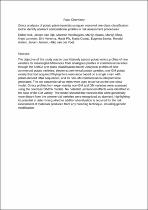 ResearchSpace
ResearchSpace
Omics analyses of potato plant materials using an improved one-class classification tool to identify aberrant compositional profiles in risk assessment procedures
JavaScript is disabled for your browser. Some features of this site may not work without it.
- ResearchSpace
- →
- Research Publications/Outputs
- →
- Journal Articles
- →
- View Item
| dc.contributor.author |
Kok, E

|
|
| dc.contributor.author |
Van Dijk, J

|
|
| dc.contributor.author |
Voorhuijzen, M

|
|
| dc.contributor.author |
Staats, M

|
|
| dc.contributor.author |
Lommen, A

|
|
| dc.contributor.author |
Venema, D

|
|
| dc.contributor.author |
Pla, M

|
|
| dc.contributor.author |
Barros, Maria EC

|
|
| dc.date.accessioned | 2019-06-05T05:55:20Z | |
| dc.date.available | 2019-06-05T05:55:20Z | |
| dc.date.issued | 2019-09 | |
| dc.identifier.citation | Kok E. et al. 2019. Omics analyses of potato plant materials using an improved one-class classification tool to identify aberrant compositional profiles in risk assessment procedures. Food Chemistry, v 292, pp 350-358. | en_US |
| dc.identifier.issn | 0308-8146 | |
| dc.identifier.issn | 1873-7072 | |
| dc.identifier.uri | https://www.sciencedirect.com/science/article/pii/S0308814618313839 | |
| dc.identifier.uri | https://doi.org/10.1016/j.foodchem.2018.07.224 | |
| dc.identifier.uri | http://hdl.handle.net/10204/11003 | |
| dc.description | Copyright: 2019 Elsevier. Due to copyright restrictions, the attached PDF file only contains the abstract of the full text item. For access to the full text item, kindly consult the publisher's website. | en_US |
| dc.description.abstract | The objective of this study was to quantitatively assess potato omics profiles of new varieties for meaningful differences from analogous profiles of commercial varieties through the SIMCA one-class classification model. Analytical profiles of nine commercial potato varieties, eleven experimental potato varieties, one GM potato variety that had acquired Phytophtora resistance based on a single insert with potato-derived DNA sequences, and its non-GM commercial counterpart were generated. The ten conventional varieties were used to construct the one-class model. Omics profiles from experimental non-GM and GM varieties were assessed using the one-class SIMCA models. No potential unintended effects were identified in the case of the GM variety. The model showed that varieties that were genetically more distant from the commercial varieties were recognized as aberrant, highlighting its potential in determining whether additional evaluation is required for the risk assessment of materials produced from any breeding technique, including genetic modification. | en_US |
| dc.language.iso | en | en_US |
| dc.publisher | Elsevier | en_US |
| dc.relation.ispartofseries | Worklist;21993 | |
| dc.subject | Omics profiling | en_US |
| dc.subject | Compositional analysis | en_US |
| dc.subject | Genetically modified organism | en_US |
| dc.subject | GMO | en_US |
| dc.subject | Risk assessment | en_US |
| dc.title | Omics analyses of potato plant materials using an improved one-class classification tool to identify aberrant compositional profiles in risk assessment procedures | en_US |
| dc.type | Article | en_US |
| dc.identifier.apacitation | Kok, E., Van Dijk, J., Voorhuijzen, M., Staats, M., Lommen, A., Venema, D., ... Barros, M. E. (2019). Omics analyses of potato plant materials using an improved one-class classification tool to identify aberrant compositional profiles in risk assessment procedures. http://hdl.handle.net/10204/11003 | en_ZA |
| dc.identifier.chicagocitation | Kok, E, J Van Dijk, M Voorhuijzen, M Staats, A Lommen, D Venema, M Pla, and Maria EC Barros "Omics analyses of potato plant materials using an improved one-class classification tool to identify aberrant compositional profiles in risk assessment procedures." (2019) http://hdl.handle.net/10204/11003 | en_ZA |
| dc.identifier.vancouvercitation | Kok E, Van Dijk J, Voorhuijzen M, Staats M, Lommen A, Venema D, et al. Omics analyses of potato plant materials using an improved one-class classification tool to identify aberrant compositional profiles in risk assessment procedures. 2019; http://hdl.handle.net/10204/11003. | en_ZA |
| dc.identifier.ris | TY - Article AU - Kok, E AU - Van Dijk, J AU - Voorhuijzen, M AU - Staats, M AU - Lommen, A AU - Venema, D AU - Pla, M AU - Barros, Maria EC AB - The objective of this study was to quantitatively assess potato omics profiles of new varieties for meaningful differences from analogous profiles of commercial varieties through the SIMCA one-class classification model. Analytical profiles of nine commercial potato varieties, eleven experimental potato varieties, one GM potato variety that had acquired Phytophtora resistance based on a single insert with potato-derived DNA sequences, and its non-GM commercial counterpart were generated. The ten conventional varieties were used to construct the one-class model. Omics profiles from experimental non-GM and GM varieties were assessed using the one-class SIMCA models. No potential unintended effects were identified in the case of the GM variety. The model showed that varieties that were genetically more distant from the commercial varieties were recognized as aberrant, highlighting its potential in determining whether additional evaluation is required for the risk assessment of materials produced from any breeding technique, including genetic modification. DA - 2019-09 DB - ResearchSpace DP - CSIR KW - Omics profiling KW - Compositional analysis KW - Genetically modified organism KW - GMO KW - Risk assessment LK - https://researchspace.csir.co.za PY - 2019 SM - 0308-8146 SM - 1873-7072 T1 - Omics analyses of potato plant materials using an improved one-class classification tool to identify aberrant compositional profiles in risk assessment procedures TI - Omics analyses of potato plant materials using an improved one-class classification tool to identify aberrant compositional profiles in risk assessment procedures UR - http://hdl.handle.net/10204/11003 ER - | en_ZA |





